Oxygenz Country Report: Germany - Johnson Controls Inc.
Oxygenz Country Report: Germany - Johnson Controls Inc.
Oxygenz Country Report: Germany - Johnson Controls Inc.
Create successful ePaper yourself
Turn your PDF publications into a flip-book with our unique Google optimized e-Paper software.
Global WorkPlace Innovation<br />
<strong>Oxygenz</strong> <strong>Country</strong> <strong>Report</strong>:<br />
<strong>Germany</strong><br />
Understanding the<br />
Generation Y in <strong>Germany</strong>:<br />
How would they like<br />
to work in 2010?
Content<br />
Executive Summary and implications for employers in <strong>Germany</strong>......................................................... 5<br />
Introduction...................................................................................................................................... 6<br />
Methodology..................................................................................................................................... 9<br />
Who is Generation Y in <strong>Germany</strong>...................................................................................................... 11<br />
<strong>Oxygenz</strong> <strong>Germany</strong> Results for the Generation Y................................................................................ 15<br />
Results Analysis............................................................................................................................... 17<br />
Conclusion...................................................................................................................................... 19<br />
Further Information......................................................................................................................... 21<br />
List of figures<br />
Figure 1: German Demographic Pyramid, 2010 – Source – US Census Bureau.................................... 11<br />
Figure 2: <strong>Germany</strong>: 18 – 25 years old individual space preferences................................................... 12<br />
Figure 3: <strong>Germany</strong>: 18 – 25 years old preferences and expectations for working patterns................. 12<br />
Figure 4: <strong>Germany</strong>: 18 – 25 years old preferred collaborative working environment.......................... 13<br />
Figure 5: <strong>Germany</strong>: 18 – 25 years old preferred reception services.................................................... 13<br />
Figure 6: Location of the place to work, per country, 18-25 years old............................................... 15<br />
Figure 7: Flexible pattern of work, 18-25 years old, per country....................................................... 16<br />
Figure 8: Choice of desk space while at work, 18-25 years old, per country...................................... 17<br />
2<br />
3<br />
Copyright © 2010 <strong>Johnson</strong> <strong>Controls</strong>.<br />
All Rights Reserved.<br />
Global WorkPlace Innovation
Executive Summary<br />
The <strong>Oxygenz</strong> survey in <strong>Germany</strong> gathered 1479 respondents, including 841<br />
between the age of 18 and 25 years old. The German survey was specially<br />
conducted online via the survey website www.oxygenz.com from the 17th<br />
January to 7th February 2010 to gather a significative sample of respondents<br />
and compared it against our 2009 global benchmark. To date, the German<br />
Generation Y (841) sample makes up for 24 percent of the total Generation Y<br />
sample which globally attracted 3509 respondents within this age group.<br />
We are looking at a generation which is concerned<br />
about the way they will work. The results have<br />
shown that their preferences and expectations vary<br />
some greatly with other countries we studied and<br />
used here as a benchmark (United States, India,<br />
China, United Kingdom). These variations are:<br />
Why they choose an employer –<br />
Compensation comes first before learning<br />
opportunities<br />
Where they want to work – City location<br />
How they want to travel to work – After Car<br />
comes Cycling<br />
What environment they aspire to work in<br />
– far from classical and pale, more vibrant<br />
and light<br />
What pattern for work they prefer - Mobile<br />
and Flexible<br />
How they want to collaborate – formally in<br />
meeting rooms and as a team in dedicated<br />
team spaces<br />
How they want their employer to be – more<br />
than just environmentally friendly and<br />
showing it<br />
The implications for employers are significant and they<br />
must respond to, or at least consider, their needs:<br />
Physical: into the Workplace itself and the<br />
location, shape, size, design<br />
Human: more flexible contractual<br />
arrangements through their pattern of<br />
work, their mobility on site<br />
Ethical: employers have to be greener, more<br />
environmentally friendly rather than aware<br />
Emotional: create a sense of community,<br />
team spirit and well being<br />
From 2000 to 2050 it is anticipated that the<br />
German working population will reduced by 30% 1 . If<br />
employers want to attract and retain young talent,<br />
they will need to consider the following results.<br />
Dr. Marie Puybaraud<br />
Director of Global WorkPlace Innovation<br />
<strong>Johnson</strong> <strong>Controls</strong><br />
marie.c.puybaraud@jci.com<br />
1<br />
. Herwig Birg, Population expert, 2007<br />
4<br />
5<br />
Copyright © 2010 <strong>Johnson</strong> <strong>Controls</strong>.<br />
All Rights Reserved.<br />
Global WorkPlace Innovation
Introduction<br />
The Generation Y: Like How They Work – Work How They Like<br />
People aged 18 between 25, who are also known as Generation Y, are the newest and youngest<br />
members of our work forces. All over the world Generation Y is making their presence felt, causing<br />
businesses to rethink their working practices and starting new waves of social and business<br />
transformation. They are a remarkable generation and in our view, there are at least six reasons why we<br />
need to understand them, and how they relate to work:<br />
There are not enough of them coming into the workforce and the working population is already<br />
shrinking<br />
They are transformational: They are challenging common and established working practices,<br />
embracing communication applications like social networks to using the latest technologies<br />
They do things differently: They are agile – multi-taskers<br />
They are techno-savvy: They want and have the latest technology, like iPhones and iPods, they<br />
are regular Skypers<br />
The Generation Y apparently believes they can achieve anything. They are leadership focused,<br />
collaborative and seek meaning in work and opportunity to learn. Natives of the digital world, they are<br />
frequently portrayed as demanding, selfish, text-addicted and job-hoppers with little loyalty to their<br />
employers. Besides, they are more urban focused and buy quickly into new concepts and ideas.<br />
In <strong>Germany</strong> the Generation Y are under more financial pressure than the previous German generations.<br />
The German Generation Y has grown up with green issues into their way of living. But how different is<br />
the German Generation Y at work compared to others around the world?<br />
<strong>Oxygenz</strong> focuses on:<br />
Workplace: the physical environment in<br />
which we work<br />
Workspace: the individual space in which<br />
we work<br />
Ways of Working: the way we arrange our<br />
working day<br />
Real Estate & Facilities Management Services:<br />
the level of support services in the working<br />
environment<br />
Creativity & Productivity: the triggers that<br />
enhance creativity and productivity<br />
What is...<br />
OXYGENZ is a large-scale research<br />
project, which will make a significant<br />
contribution to companies’ knowledge<br />
on how they might use their real estate<br />
and facilities as strategic assets to<br />
attract and retain scarce talent. We<br />
must attach a great importance to<br />
diversity in our workplaces and the<br />
factors that must be taken into account<br />
when considering workplace as a likely<br />
strategic weapon in the battle to attract<br />
and retain scarce young talent.<br />
6<br />
7<br />
Copyright © 2010 <strong>Johnson</strong> <strong>Controls</strong>.<br />
All Rights Reserved.<br />
Global WorkPlace Innovation
Methodology<br />
The German survey was specially conducted online via the survey website www.oxygenz.com from 17th<br />
January to 7th February 2010. The objective was to gather a significative sample of respondents in<br />
<strong>Germany</strong> and compare it against our global benchmark, calculated in December 2009 and published in our<br />
<strong>Oxygenz</strong> Global <strong>Report</strong>.<br />
{<br />
6,728<br />
The total number of<br />
respondents in our global<br />
sample in February 2010:<br />
The global survey included special samples<br />
on the Generation Y (18-25 years old) in:<br />
US: 539<br />
3,509 (18 - 25-year-olds)<br />
2,178 (26 - 35-year-olds)<br />
470 (36 - 45-year-olds)<br />
489<br />
841<br />
China: <strong>Germany</strong>:<br />
897 286<br />
India: UK:<br />
The respondents were gathered over a 3 week<br />
period via a viral advertising campaign which<br />
directly targeted the respondents within this<br />
specific age group:<br />
On-line campaign on the <strong>Johnson</strong> <strong>Controls</strong><br />
website<br />
On-line advertising on the social network<br />
Facebook in <strong>Germany</strong><br />
On-line advertising on Google<br />
Direct marketing and incentives with<br />
a population of 18 - 35 years old in<br />
collaboration with Panelbiz<br />
(www.panelbiz.com)<br />
<strong>Oxygenz</strong> Partners<br />
www.globalworkplaceinnovation.com<br />
Research Question:<br />
Generation Y and the Workplace is a research<br />
project that seeks to understand the<br />
importance the 18 to 25 years old attach to<br />
their future workplace.<br />
How important is the workplace in attracting,<br />
recruiting and retaining Generation Y<br />
workers and what factors contribute to<br />
talent management per industry sector,<br />
country and gender?<br />
www.thinkidea.co.uk<br />
To date, the German Generation Y sample (841) makes up for 24 percent of the total Generation Y<br />
sample which globally attracted 3509 respondents. The profile of our Generation Y…<br />
841<br />
The number of 18-25<br />
years old respondents<br />
in <strong>Germany</strong>:<br />
{<br />
Representing 24.0% of the total global<br />
sample of 6,728 respondents<br />
324 = 38.5% of males and<br />
517 = 61.5% of females<br />
608 = 72.3% of respondents are studying<br />
Industry:<br />
Haworth<br />
BBC<br />
Deloitte<br />
The Smart Work Company<br />
e-Work<br />
NEW WOW<br />
Corenet Global<br />
eOffice<br />
Academics:<br />
CEPT<br />
Chulalongkom University<br />
Cornell University<br />
Fraunhofer Institute<br />
Hope College<br />
Liverpool John Moore University<br />
Tamassath University<br />
Texas University<br />
The Hague University<br />
Tongjii Univesity<br />
University of Central London<br />
University of Pretoria<br />
University of the West of England<br />
University of Wisconsin<br />
Wellingkar Institute<br />
8<br />
9<br />
Copyright © 2010 <strong>Johnson</strong> <strong>Controls</strong>.<br />
All Rights Reserved.<br />
Global WorkPlace Innovation
Who is the Generation Y in the <strong>Germany</strong>?<br />
In <strong>Germany</strong>, Generation Y (18 to 25 years) makes up approximately 15% of today’s population 1 . Like<br />
their peers around the world they are non-conformist, value driven, innovative and challenging. Over<br />
the next 10 to 15 years <strong>Germany</strong>’s ageing population, the Baby Boomers, will retire and will leave a<br />
significant gap in the labour market. As the German population is getting older and as the birth rate<br />
has shrunk to 1.3 in 2009, it is anticipated that from 2000 to 2050 the workforce will be<br />
reduced by 30%. With a population that counted more than 50% of 40+ year olds in 2005, officials say<br />
that the German workforce is now officially shrinking2. However, if this demographic trend continues<br />
over 25 in this direction, it will take 75 years to stop this process 3 .<br />
In <strong>Germany</strong>, the generation Y is regarded as the “generation internship” – young academics, highly<br />
educated, with a university degree, but very little income and huge problems to enter the job market<br />
Figure 1: German Demographic Pyramid, 2010 – Source – US Census Bureau<br />
The future population of <strong>Germany</strong> will require a high quality of life until a late age and would expect<br />
both mental and physical fitness. More women will be working and the German society and corporations<br />
will be more diverse. The work-life balance in German society will remain an important value. It is<br />
expected that the Generation Y will dominate the workforce for the next half a century. Employment<br />
opportunities will rise again, thereby creating an economically attractive market for the Generation Y.<br />
which will continue to educate themselves, creating a highly technical skilled labour force, which seeks<br />
to intellectual challenge 4 .<br />
10<br />
1<br />
US Census Bureau, International Database, February 2010<br />
2<br />
Froehlich, Robert, J., Froehlich, Bob,(2006), Investment Megatrends, New Jersey, USA, John Wilkes & Sons<br />
3<br />
Herwig Birg, Population expert, 2007<br />
4<br />
Fraunhofer Institute, Office 21 Project, 2008 and IAB , 2005<br />
11<br />
Copyright © 2010 <strong>Johnson</strong> <strong>Controls</strong>.<br />
All Rights Reserved.<br />
Global WorkPlace Innovation
<strong>Oxygenz</strong> <strong>Germany</strong> Results for the Generation Y:<br />
841<br />
841 The number<br />
of 18-25 years old<br />
Location<br />
respondents in <strong>Germany</strong>:{<br />
70% would prefer to work in an urban setting<br />
Representing 24.0% of the total global<br />
sample of 6,728 respondents<br />
324 = 38.5% of males and<br />
517 = 61.5% of females<br />
608 = 72.3% of respondents are studying<br />
Workspace<br />
60% would be comfortable in a space of 12 to<br />
16 sqm<br />
Wooden floors are preferred by 75%<br />
74% prefers to have a little art in their<br />
workspace<br />
Figure 4: <strong>Germany</strong>: 18 – 25 years old preferred<br />
collaborative working environment<br />
A modern or contemporary style with<br />
subtle, clinical and relaxing colours<br />
42% would prefer only natural light in<br />
their working environment<br />
73% prefer to work in a mobile way<br />
but 89% would like to personalise their<br />
individual space<br />
Figure 2: <strong>Germany</strong>: 18 – 25 years old individual<br />
space preferences<br />
FM & Support Services<br />
Facilities & Support Servives:<br />
56% would prefer to have a 5 star<br />
reception services or above and 75%<br />
would like to have a refectory whilst 22%<br />
prefers to have access to a coffee shop<br />
Travel<br />
31% by bar, of which 30% would prefer to<br />
drive a hybrid car<br />
26% cycling<br />
Figure 5: <strong>Germany</strong>: 18 – 25 years old preferred<br />
reception services<br />
4% by motorcycle of scooter<br />
23% by public transport<br />
Top 3 factors for creativity:<br />
Top 3 factors for productivity<br />
12<br />
Figure 3: <strong>Germany</strong>: 18 – 25 years old preferences<br />
and expectations for working patterns<br />
47% would prefer to have an employer which<br />
provides a workplace which goes beyond<br />
environmentally friendly<br />
16% by walking<br />
Top 3 priorities when chosing an employer:<br />
1. Compensation<br />
2. Work Colleagues<br />
3. Meaningful work<br />
1. The people around me<br />
2. The ambiance & atmosphere<br />
3. Workspace around me<br />
1. Technology in my office<br />
2. The people around me<br />
3. Workspace around me<br />
13<br />
Copyright © 2010 <strong>Johnson</strong> <strong>Controls</strong>.<br />
All Rights Reserved.<br />
Global WorkPlace Innovation
Results Analysis<br />
The following pages present the results of the analysis of the German Generation Y sample (841<br />
respondents between the age of 18 and 25 years old) and compare and contrast these German results<br />
against our global results.<br />
The German Generation Y has very different expectations compared to our worldwide sample and results<br />
diverge greatly with other countries we studied.<br />
High on the agenda of priorities of the Generation Y in <strong>Germany</strong>, Compensation is a priority when choosing<br />
a company. Compensation has never been one of the top three priorities amongst our respondent aged<br />
36 and less. This criteria of choice usually appears for older generations, demonstrating the concerns this<br />
age group has about work. Compared to other age groups we benchmark our German sample against,<br />
Opportunities for Learning is a clear top choice, but only in 6th position for the German Generation Y.<br />
Triggers of productivity and creativity are very difficult to assess and often depend on qualitative<br />
issues around people at work. The German Generation Y is no different from our global sample: People<br />
+ Ambiance & Atmosphere + Technology is still the magic formula to trigger productivity and creativity.<br />
The workplace (this ambiance & atmosphere) is very central to their choice, on one hand moving towards<br />
people to boost creativity and towards technology to boost productivity. But it is fascinating to note that this<br />
time the workspace itself, as a place of course to meet and work, and a place to learn, where knowledge is<br />
gathered, seems to impact on creativity and productivity.<br />
These results support how crucial the right working environment is to influence people performance. The<br />
workplace is considered here critical to the Generation Y in <strong>Germany</strong>. Location and travel choices also show<br />
that a city office should be priority of choice for Real Estate decision makers and Human Resources managers.<br />
Attracting people to cities and choosing an urban environment seems to be key to attract and retain young<br />
employees. However 31% still prefer a rural to semi rural setting, showing again a wide range of demands.<br />
Figure 6: Location of the place to work, per country, 18-25 years old<br />
14<br />
15<br />
Copyright © 2010 <strong>Johnson</strong> <strong>Controls</strong>.<br />
All Rights Reserved.<br />
Global WorkPlace Innovation
Results Analysis Continued<br />
31% of the 18-25 years old in <strong>Germany</strong> would chose a car to go to work against more (38%) of the 26<br />
to 35 years old. However, this figure is far less than in the US (52%) and India (49%) and even the UK<br />
(34.5%). We are looking at a generation of youngsters embracing green travel: 26% would cycle to work,<br />
16% would walk to work and 23% would use public transport.<br />
These results are above our worldwide benchmark for this age group and very different from China (55%),<br />
the UK (65%), India (76%) and even the US (80%). The large majority of respondents in <strong>Germany</strong> also tells<br />
us that they are comfortable in much larger space than other countries (60% feel comfortable in a space of<br />
12sqm to 16sqm metres).<br />
With this new green way of going to the office, again the Generation Y in <strong>Germany</strong> is expecting far<br />
more flexibility in their working patterns: 76% prefer their employers to offer flexible working but only<br />
41% are expecting their employers to offer it. A message sent out to Human Resources Directors will<br />
be to consider offering more flexibility in the working arrangements and making it clearly more visible<br />
to employees. This difference between expectations and preferences needs to be addressed by HR.<br />
The level of mobility is however aligned to our worldwide benchmark, with 73% of the Generation Y in<br />
<strong>Germany</strong> who have expressed a desire to be mobile, rather than static always at a desk.<br />
Figure 8: Choice of desk space while at work, 18-25 years old, per country<br />
Figure 7: Flexible Pattern of Work, 18-25 years old, per country<br />
The issue of space is definitely important to this generation in <strong>Germany</strong>. As collaboration is getting more<br />
and more crucial, we asked our respondents what type of collaborative spaces they would like to have<br />
access to while at work. 37% prefer access to formal meeting spaces (the highest amongst the 18 to<br />
25 years old country groups we studied worlwide) while 31% prefer to access a team space (the lowest<br />
amongst the studied countries) and 31% prefer to access breakout spaces. Having no meeting space is<br />
actually not acceptable: none of the respondents in <strong>Germany</strong> have chosen ‘no meeting rooms’.<br />
While the majority of the Generation Y in <strong>Germany</strong> prefers a modern workplace interior with subtle,<br />
clinical and relaxing colours in their working environment, 21% wants vibrant/bright colours. The<br />
ambiance & atmosphere we mentioned earlier is created partly by the design of the workplace, the<br />
interior arrangements. Soft and natural finishes are also a tendency for this age group, clearly looking<br />
for an inviting environment, open and light. These results for German match the worldwide results, but<br />
tend to show greater aspiration for a natural and stimulating environment: modern environment, open,<br />
light, with some sparks of colours, natural finishes like wood.<br />
This emotional engagement with their workplace is also expressed in their desire to personalise their<br />
workspace: 89% of the 18 to 25 years old in <strong>Germany</strong> want to personalise their workspace! Again not<br />
surprising as 87% want to have their own desk and only 8% want to share a desk, leaving few opportunities<br />
to maximise desk to people ratios anywhere close to 1 desk to 2 people.<br />
The preferences of the Generation Y in <strong>Germany</strong> for on-site services show some striking results: they are<br />
the lowest demanding workforce amongst the country we studied. Only 56% prefer a high level of service<br />
(from 5* to 7*) on site equivalent to a Concierge service on site. Access to a broad range of catering<br />
facilities is also desired, but they privilege Canteen facilities, Kitchen on site or Coffee Shops/Cafés, rather<br />
than restaurant facilities and snack bars. 22% would prefer access to a Gym on site or close by, 36% to<br />
communal spaces on site and 30% to a collection of commercial facilities (hairdresser, shops, bank…). 10%<br />
have expressed a preference for venues in the workplace (clubs/ venues / halls).. 10% have expressed a<br />
preference for venues in the workplace (nightclubs/concert halls).<br />
More than ever before the Generation Y in <strong>Germany</strong> is shouting out (96%) to their employers that they want<br />
them to be green, be sustainable and show it well above the standard environmental compliance: 47%<br />
want their employer to go far beyond legal compliance and environmentally friendly rather than aware.<br />
16<br />
17<br />
Copyright © 2010 <strong>Johnson</strong> <strong>Controls</strong>.<br />
All Rights Reserved.<br />
Global WorkPlace Innovation
Sustainability<br />
Socialability<br />
Way of Working<br />
ITWeb2.0 Platform<br />
Conclusion<br />
We are looking at a generation which is concerned about the way they work:<br />
Location<br />
Cost<br />
Efficiency<br />
Infrastructure<br />
Travel<br />
Support Services<br />
Reception<br />
IT<br />
Environmental Policies<br />
Design<br />
Image<br />
Style<br />
Atmosphere<br />
Work settings<br />
Individual space<br />
Collaborative space<br />
Shared space<br />
Support space<br />
Virtual space<br />
Work style<br />
Mobility status<br />
HR Contract<br />
Working patterns<br />
Managerial Style<br />
Real Estate<br />
Facilities<br />
Management<br />
Workplace<br />
Human<br />
Resources<br />
Social<br />
Structure<br />
Technology<br />
Platform<br />
A Workplace to<br />
attract and retain<br />
talent from the<br />
Generation Y<br />
A sustainable<br />
and social<br />
structure and<br />
a physical<br />
and virtual<br />
environment in<br />
which people<br />
work, evolve<br />
and grow as<br />
individuals and<br />
teams.<br />
Why they choose an employer – Compensation comes first before learning<br />
opportunities<br />
Where they want to work – City location<br />
How they want to travel to work – After Car comes Cycling<br />
What environment they aspire to work in – not classical and pale, but more<br />
vibrant and light<br />
What pattern of work they prefer - Mobile and Flexible<br />
How they want to collaborate – formally in meeting rooms and as a team in<br />
dedicated team spaces<br />
How they want their employer to behave – very environmentally responsible<br />
and demonstrating it in the workplace<br />
TOTAL 18 – 25 <strong>Germany</strong> 18 – 25<br />
Generation Y total 3509 (52.2% of the total sample) 841 (24.0% of the total sample )<br />
Males 1539 (43.9% of the 18 – 25 sample) 324 (38.5% of the German 18 – 25 sample)<br />
Females 1970 (56.1% of the 18 – 25 sample) 517 (61.5% of the German 18 – 25 sample)<br />
Studying 2640 (75.2% of the 18 – 25 sample) 608 (72.3% of the German 18 – 25 sample)<br />
Location<br />
Natural Light<br />
Workplace<br />
Travel<br />
74% (34% urban + 40% sightly urban)<br />
would prefer to work in an urban<br />
setting<br />
39% would prefer only natural light in<br />
their working environment<br />
A modern or contemporary style with<br />
subtle, clinical and relaxing colours<br />
40% by car of which 41% would prefer<br />
to drive a hybrid car<br />
14% cycling<br />
10% by motorcycle or scooter<br />
19% by public transport<br />
17% walking<br />
70% (29% urban + 41% sightly urban) would<br />
prefer to work in an urban setting<br />
42% would prefer only natural light in their<br />
working environment<br />
A modern or contemporary style with<br />
subtle, clinical and relaxing colours<br />
31% by car of which 30% would prefer to<br />
drive a hybrid car<br />
26% cycling<br />
4% by motorcycle or scooter<br />
23% by public transport<br />
16% walking<br />
18<br />
Green<br />
Networked<br />
Mobile<br />
Cloud<br />
Environment<br />
Top 3 priorities<br />
when choosing an<br />
employer<br />
54% would prefer to have an<br />
employer which provides a workplace<br />
which goes beyond environmentally<br />
compliance<br />
1.Work Colleagues<br />
2.Opportunities for learning<br />
3.Quality of life<br />
47% would prefer to have an employer<br />
which provides a workplace which goes<br />
beyond environmentally compliance<br />
1.Compensation<br />
2.Work Colleagues<br />
3.Meaningful work<br />
19<br />
Copyright © 2010 <strong>Johnson</strong> <strong>Controls</strong>.<br />
All Rights Reserved.<br />
Global WorkPlace Innovation
Further Information<br />
<strong>Johnson</strong> <strong>Controls</strong> Global WorkPlace Solutions is the leading global facilities management solutions provider.<br />
With over 50 years experience in the facilities management business, <strong>Johnson</strong> <strong>Controls</strong> has the expertise<br />
to deliver comprehensive Workplace strategies that support your global facility portfolio. Our approach to<br />
facilities management outsourcing is unique. We work with clients to understand their business needs and<br />
then we create tailored solutions designed to meet those needs. We are accountable for implementing our<br />
solutions and then for guaranteeing the outcomes promised by our recommendations. What we deliver are<br />
comprehensive solutions that are good for our customers’ organisations.<br />
Global WorkPlace Innovation (GWi) is the research and development programme of Global WorkPlace<br />
Solutions and aims to drive innovation and thought leadership in workplace solutions, globally; support<br />
customers’ needs and deliver advanced solutions. GWi also aims to challenge the status quo, leading<br />
change and delivering added value through innovation excellence.<br />
Authors<br />
Dr. Marie Puybaraud Director - Global WorkPlace Innovation - marie.c.puybaraud@jci.com<br />
Stefan Wolter - Director Strategic Marketing EMEA - stefan.wolter@jci.com<br />
Eline Leussink, MA - Senior Consultant - eline.leussink@jci.com<br />
Art & Design<br />
Amber Pimm-Jones - iDEA - www.thinkidea.co.uk<br />
Contact<br />
Dr. Marie Puybaraud<br />
Director Global WorkPlace Innovation<br />
<strong>Johnson</strong> <strong>Controls</strong> Global WorkPlace Solutions<br />
London<br />
UK<br />
Tel: +44 (0) 7966 563 167<br />
marie.c.puybaraud@jci.com<br />
For information about <strong>Johnson</strong> <strong>Controls</strong> Global WorkPlace<br />
Innovation research and development programme, please go to:<br />
www.globalworkplaceinnovation.com<br />
20<br />
21<br />
Copyright © 2010 <strong>Johnson</strong> <strong>Controls</strong>.<br />
All Rights Reserved.<br />
Global WorkPlace Innovation
Copyright © 2010 <strong>Johnson</strong> <strong>Controls</strong>.<br />
All Rights Reserved.<br />
Global WorkPlace Innovation



![[PDF] JCI Gage Standards - Johnson Controls Inc.](https://img.yumpu.com/23687663/1/190x245/pdf-jci-gage-standards-johnson-controls-inc.jpg?quality=85)
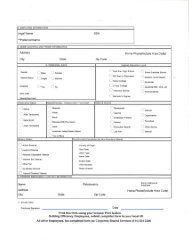
![[PDF] Download our Full Range of Li-Ion Technologies Spec Sheet](https://img.yumpu.com/23687660/1/190x245/pdf-download-our-full-range-of-li-ion-technologies-spec-sheet.jpg?quality=85)

![[PDF] NA Direct & Indirect Supplier Communication Letter - Johnson ...](https://img.yumpu.com/23687657/1/190x245/pdf-na-direct-indirect-supplier-communication-letter-johnson-.jpg?quality=85)
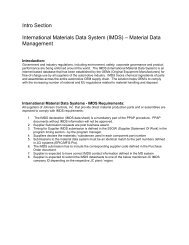
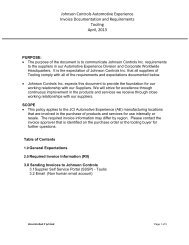

![[PDF] [PDF] - Johnson Controls Inc.](https://img.yumpu.com/23687654/1/190x245/pdf-pdf-johnson-controls-inc.jpg?quality=85)
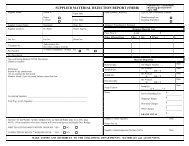
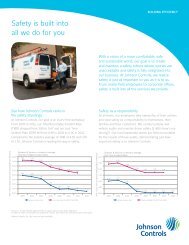
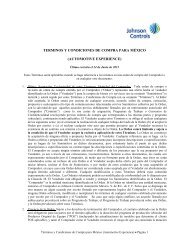

![[PDF] Warren S. Johnson Society of Retirees, Inc.](https://img.yumpu.com/23687624/1/190x245/pdf-warren-s-johnson-society-of-retirees-inc.jpg?quality=85)